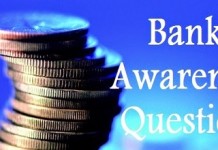Hello Aspirants,
Welcome to Banking Awareness Quiz in AffairsCloud.com. Here we are creating quiz covering important questions which are common for all the bank exams and other competitive exams.
- Which of the following is a special type of credit card with stored money value?
A. Preset Value Card
B. Stored Value Card
C. Both(A) & (B)
D. None of the AboveB. Stored Value Card
Explanation:
A stored-value card is a payments card with a monetary value stored on the card itself, not in an external account maintained by a financial institution. Stored-value cards differ from debit cards, where money is on deposit with the issuer, and credit cards which are subject to credit limits set by the issuer. - A financial product which provides senior citizens with funds against their home equity is referred as _______
A. Mortgage
B. Reverse Mortgage
C. Repossession
D. RefinanceB. Reverse Mortgage
Explanation:
A reverse mortgage or home equity conversion mortgage (HECM) is a special type of home loan for older home owners (62 years or older) that requires no monthly mortgage payments. Borrowers are still responsible for property taxes and home owner’s insurance. - ________ is a cheque rather an amount of cheque, which is above the balance available in the account of the payer.
A. Travellers cheque
B. Multicity Cheque
C. Mutilated Cheque
D. Over DraftD. Over Draft
Explanation:
An overdraft is an extension of credit from a lending institution when an account reaches zero. An overdraft allows the individual to continue withdrawing money even if the account has no funds in it. - Which of the following term refers the illegal escape from the tax payment?
A. Tax Break
B. Tax Evasion
C. Tax Shifting
D. None of the AboveB. Tax Evasion
Explanation:
Tax evasion is an illegal practice where a person, organization or corporation intentionally avoids paying his/her/its true tax liability. Those caught evading taxes are generally subject to criminal charges and substantial penalties. - A situation which is providing some relief from tax in whole or part is referred as _________
A. Tax Break
B. Tax Evasion
C. Tax Shifting
D. None of the AboveA. Tax Break
Explanation:
Tax break is a term referring to any item which avoids taxes, including any tax exemption, tax deduction, or tax credit. - A type of market in which there is a relatively high degree of concentration is referred as _____
A. Mortgage Refinance
B. Oligopoly
C. Near Money
D. Open EconomyB. Oligopoly
Explanation:
Large number of potential buyers but only a few sellers is known as Oligopoly. - Which of the following cheque issued by a customer under a pre-approved arrangement with the bank?
A. Travellers cheque
B. Multi-city Cheque
C. Mutilated Cheque
D. Crossed ChequeB. Multi-city Cheque
Explanation:
A Multi-City Cheque (MCC) is one that can be written by the customer in favour of his client and is payable at par at all branches of the Bank. These are issued as Order Cheque. - A cheque for a fixed amount that may be cashed or used in payment abroad after endorsement by the holder’s signature is known as ___________
A. Travellers cheque
B. Multicity Cheque
C. Mutilated Cheque
D. Crossed ChequeA. Travellers cheque
Explanation:
Traveller’s cheque is a medium of exchange that can be used in place of hard currency. Traveller’s cheques are often used by individuals travelling on vacation to foreign countries. - A commission or fee paid, when an agent or an individual sells an investment such as mutual funds or annuity is known as _________
A. Redemption fee
B. Service Charge
C. Regressive tax
D. Sales taxA. Redemption fee
Explanation:
A mutual fund redemption fee, also referred to as a “market timing fee”, or “short-term trading fee”, is a charge by a mutual fund company to discourage investors from making a short-term “round trip” (i.e. a purchase, typically a transfer, followed by a sale within a short period of time). - A legal agreement between the lender and borrower where real estate property is used as a collateral for the loan is termed as ________
A. Mortgage
B. Reverse Mortgage
C. Repossession
D. RefinanceA. Mortgage
Explanation:
A loan that is secured by property or real estate is called a mortgage. In exchange for funds received by the homebuyer to buy property or a home, a lender gets the promise of that buyer to pay back the funds within a certain time frame for a certain cost.
AffairsCloud Recommends Oliveboard Mock Test
AffairsCloud Ebook - Support Us to Grow
Govt Jobs by Category
Bank Jobs Notification


